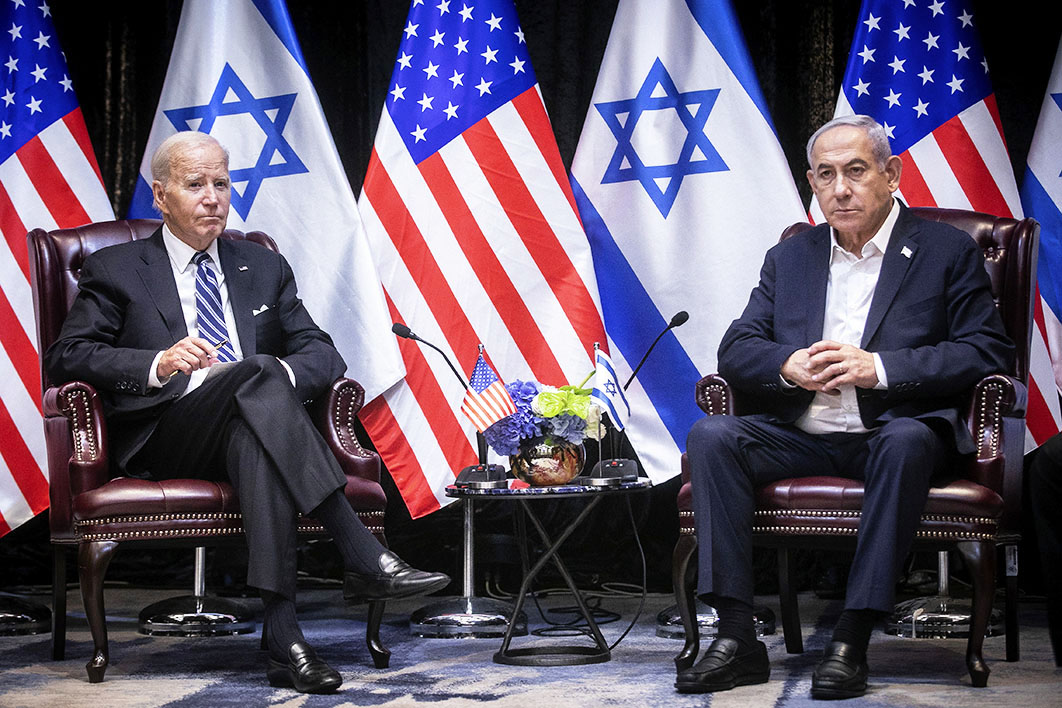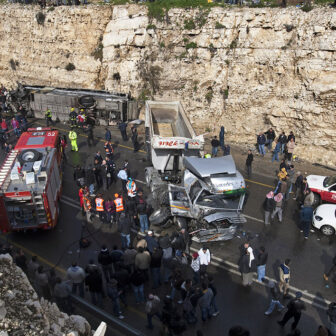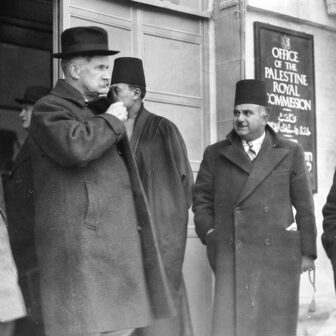Israel’s prime minister, Benjamin Netanyahu, has been at war with the Palestinians all his political life. Occasionally he has genuflected towards the notion of Palestinian statehood. That was entirely tactical. Netanyahu’s contempt for the idea that Palestinians might aspire to what many others regard as a birthright — a nation of their own — has never wavered.
Rightly, a barrage of words has been fired to describe Hamas’s recent attacks: atrocious, abhorrent, despicable, outrageous, inhuman, nihilistic. They are all well chosen. The biggest shock lay in the assault’s surprise, brutality and short-term success. How could the much-vaunted and feared Israeli intelligence and defence establishment be caught out so badly?
Martin Indyk, who served twice as the US ambassador to Israel, suggested a “total system failure on Israel’s part.” Through sophisticated spying Israelis are accustomed to knowing exactly what the Palestinians are doing. Israel has built a very expensive wall between Gaza and its side of the border. How was it possible, Indyk asked, for “a ragtag band of terrorists” to beat the “mighty” Israeli intelligence community and defence forces? The answer, in part, “was hubris — an Israeli belief that sheer force could deter Hamas, and that Israel did not have to address the long-term problems.”
Nimrod Novik, a former adviser to the late Israeli prime minister Shimon Peres, spoke of Israel’s two-layered strategic failure. Netanyahu and his current coalition, “the most extreme ever,” downplayed or ignored warnings from several Arab states about Palestinian grievances. Netanyahu pursued the illusion that even under his draconian policies — which have long turned Gaza into what Human Rights Watch calls “the world’s largest open-air prison” — Hamas would abstain from the sort of attacks that might jeopardise its hold on power in Gaza.
Haaretz journalist Amira Hass argued that Israeli security forces neglected the defence of communities near the Gaza Strip because they were preoccupied with “defending the settlers in the West Bank, their land seizures, and their rites of stone and altar worshipping.” Such neglect, she said, was inherently connected to one of the chief goals of Netanyahu and his religious Zionist supporters, accelerating the de facto annexation of most of the West Bank and increasing the settler population there. Haaretz editorialised that the government had left the Gaza border communities unprotected as “the IDF provided security for every settler whim.”
Netanyahu has been an ardent champion of West Bank settlements, the growth of which makes the idea of a viable Palestinian state fanciful. He has desisted from annexing (at least) large chunks of the occupied West Bank only because of likely US disapproval. UN figures show that in the ten years to 2022, the population of Israeli settlers in the occupied West Bank, including East Jerusalem, grew to around 700,000. The settlers live illegally in 279 Israeli settlements across the West Bank, including fourteen settlements in East Jerusalem.
The company Netanyahu keeps should give considerable pause for thought. On 1 March this year the head of a pro-settler party, Netanyahu’s finance minister Bezalel Smotrich, called for the Palestinian West Bank village of Huwara to be “erased.” This followed a settler rampage through the village that one Israeli general described as a “pogrom.” A US State Department spokesperson described Smotrich’s comments as “irresponsible… repugnant [and] disgusting.” Undeterred, Smotrich followed up by declaring that “there is no such thing as the Palestinian people.”
Last August, Netanyahu’s far-right national security minister, Itamar Ben-Gvir, exhibited a similar sneering condescension, declaring that his family’s right to move around the West Bank “is more important than freedom of movement for the Arabs.”
Israelis mourning their dead might reflect on the awful reality that, stretching back to the 1980s, Israeli governments have provided limited funding and intelligence assistance to Hamas, at first seeing the Islamist organisation as a useful counterweight to the Palestinian Liberation Organisation under the quixotic Yasser Arafat. This assistance continued after the formation of the Palestinian Authority, Israel’s nominal partner in any “peace process.”
Michael Hirsh, a columnist for Foreign Policy, commented recently that Netanyahu’s various governments ended up weakening the Palestinian Authority president, Mahmoud Abbas — who wanted to negotiate — while strengthening Hamas, which has vowed Israel’s destruction. Hirsh quoted Gilead Sher, chief of staff to former Israeli prime minister Ehud Barak, who has said that Netanyahu’s policy to “nearly topple” the Palestinian Authority fostered Hamas’s “sense of impunity and capability.” Avner Cohen, a former Israeli official who worked in Gaza for more than two decades, told the Wall Street Journal that “Hamas, to my great regret, is Israel’s creation.”
Hamas calculated, correctly, that its break-out in Gaza and Israel’s inevitably harsh response would freeze steps towards normalisation of relations between Israel and Saudi Arabia. Shortly after the Gaza attacks the Saudis issued a statement accusing Israel of ignoring their repeated warnings of an explosion “as a result of the continued occupation and deprivation of the Palestinian people of their legitimate rights.” Martin Indyk commented that the image of American weapons in Israeli hands killing large numbers of Palestinians will ignite a “strong reaction” around the Arab world. President Biden’s whistle-stop visit to Israel has done nothing to dampen that reaction.
Mousa Abu Marzouk, a senior Hamas political leader who lives in exile in Qatar (Hamas’s military commanders are based in Gaza) explained the motivation for the Gaza attacks as a profound sense of frustration and defeat. But Hamas’s embarrassment of Israel comes at an unimaginable cost to the people of Gaza. The Economist has calculated that the scale of Israel’s bombardment — 6000 bombs dropped in six days, compared with 2000 to 5000 per month across Iraq and Syria during the American-led air campaign against Islamic State from 2014 to 2019 — suggested that “the definition of military targets is being stretched to breaking-point.”
On 10 October, the Israeli Defence Forces’ Major General Ghassan Alian declared that “Human animals must be treated as such… There will be no electricity and no water [in Gaza], there will only be destruction. You wanted hell, you will get hell.” Israel’s President, Isaac Herzog, weighed in, asserting at a press conference that all citizens of Gaza were responsible for the Hamas attack. “It is not true, this rhetoric about civilians not being aware, not involved. It’s absolutely not true. They could have risen up. They could have fought against that evil regime which took over Gaza in a coup d’état.”
Such nonsense points to the glaring double standard in some commentary about Gaza. Hamas’s rule is rightly derided as brutal and authoritarian, yet there seems an expectation that ordinary Palestinians should miraculously rise up and overthrow it. In the New York Review of Books Fintan O’Toole wrote that “Hamas’s knowing provocation of Israel’s wrath against a Gazan population it cannot then defend shows that Hamas cares as little for its own civilians as it does for the enemy’s.” That is the sickening truth.
Ben Saul, head of international law at Sydney University, has argued that Hamas should be held accountable for its “atrocious war crimes.” He added, though, that Australian defence minister Richard Marles’s claim that Israel was acting within the rules of war indicated only that Marles was “poorly briefed.”
One stark Israeli violation, Saul wrote, was its medieval “complete siege” of Gaza, with no electricity, no food, no water, no fuel. “A sixteen-year blockade has already debilitated Gaza. This latest turning of the screw is unlawful and could constitute the war crime of starving civilians. It could also be unlawful collective punishment if it aims to retaliate against all Gazans for Hamas’ sins.”
Running against Netanyahu in the Israeli 2019 general election, the former Israeli army chief Benny Gantz released a campaign video boasting that during the 2014 Israel–Gaza war, “parts of Gaza were returned to the stone ages.” Gantz is now part of the emergency war cabinet and is no doubt keen to finish the job. Israel clearly has the capacity to level what is left of Gaza city, killing many (more) thousands of Palestinian men, women and children, including Hamas and other Islamist militants.
That might trigger a wider war. Martin Indyk has commented that if the Palestinian death toll rises, “Hezbollah will be tempted to join the fray. They have 150,000 rockets they can rain down on Israel’s main cities.” Even if that doesn’t happen, the question of “what now?” only comes sooner. If Hamas is obliterated, what then? Who will rule Gaza? The Israelis? They tried that once before, with unhappy results. The Palestinian Authority? It struggles to maintain its shaky rule in the West Bank.
Whatever the future, it will be troublesome, to say the least. In one way or another we will all pay a price. •




